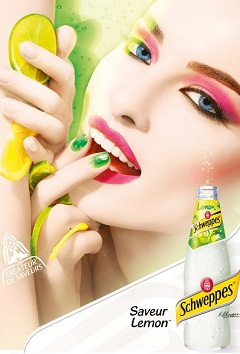I Buy the Cheapest Seltzer
I don't get it. Seltzer has only two ingredients: water and carbon dioxide, so why would anyone buy a bottle of branded seltzer water that costs more than twice as much as the store brand?
The only time I will pay more for seltzer is to get it in cans because large bottles (the least expensive per ounce) lose much of their fizz shortly after opening. I usually pay between $2.50 to $2.99 for a store-branded case of 12 12-ounce cans. Branded versions usually go for a buck or two more per case.
And no, neither the sexy ads nor the Schweppervescence make me want to lay out more money for carbonated water. A few days ago, however, and this doesn't happen too often, I picked up a dozen cases of Schweppes Seltzer 12 Pack which was on sale for 3/$8.00 at my local Stop and Shop but only with the store's loyalty card.
Being Jewish, I love seltzer which was once called "Jewish Champagne."
You may wonder what being Jewish has to do with taste preferences. Actually what you are able to taste depends on your race and ethnicity. When I was running a vending machine business in the early 1970s I quickly learned to put more menthol brands of cigarettes in my machines for locations patronized by Blacks. Just by looking at the brand selections of smokes in a machine I could tell you with fairly good accuracy the ethnic and racial mix of that location's customers.
In 1965, during a Psychology class at the Hebrew University in Jerusalem the instructor put a drop of a liquid into each student's mouth and then asked the class to step into different corners of the classroom depending on whether they thought the drop was sweet, sour, bitter, or salty. Amazingly, the class split into 4 groups despite tasting the exact same liquid.
Of course there are other factors such as social class, sex and age that affect our taste buds but genetics trumps all. If you were born without TAS2R38 taste receptors then you will lack the ability to taste bitter substances no matter how old you get, how rich you are, or the culture you were born into. That is to say, it is not that you are what you eat, but rather you eat what you are.
And so it is with seltzer. It is not the fizz or the carbon-dioxide bubbles that we taste - whether you like carbonation or not depends on whether you have carbonic anhydrase 4 enzyme in the sourness taste receptors of your tongue (1).
Jews must have that enzyme big-time.
Notes
(1):
NPR, Study: When Soda Fizzes, Your Tongue Tastes It
researchers found that sour-sensing cells have a certain enzyme on their surfaces, according to a report on the research in the journal Science. This enzyme, carbonic anhydrase 4, belongs to a family of enzymes that respond to carbon dioxide.
"This is a particularly interesting carbonic anhydrase. It's actually stuck on the outside surface of cells," says Ryba, who says it appears to cause a reaction with carbon dioxide that generates acidity just outside the sour-sensing cells. "That's why we think carbon dioxide causes a taste response."


